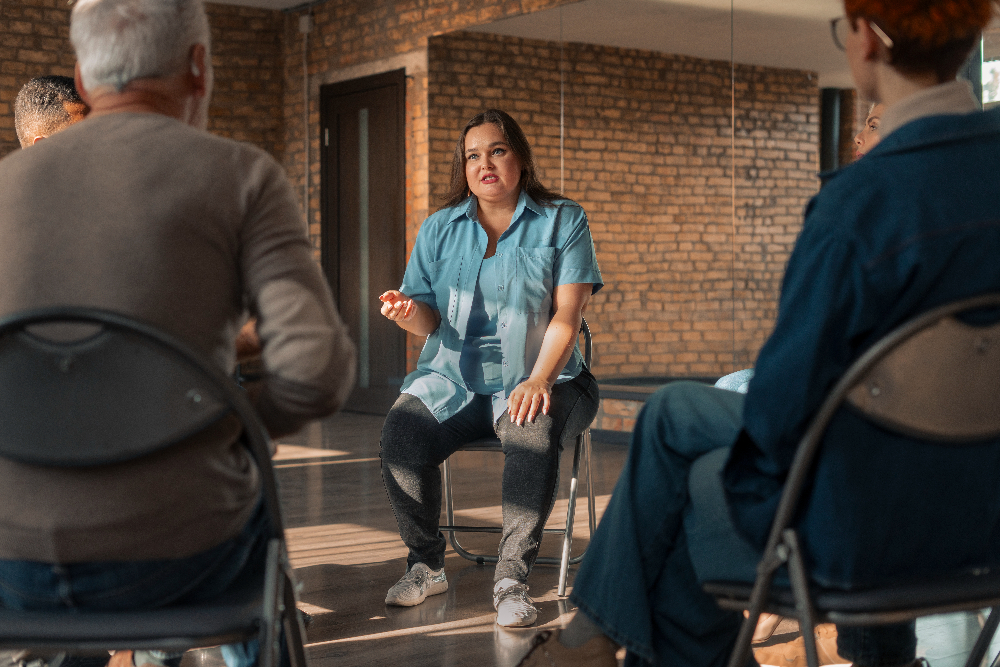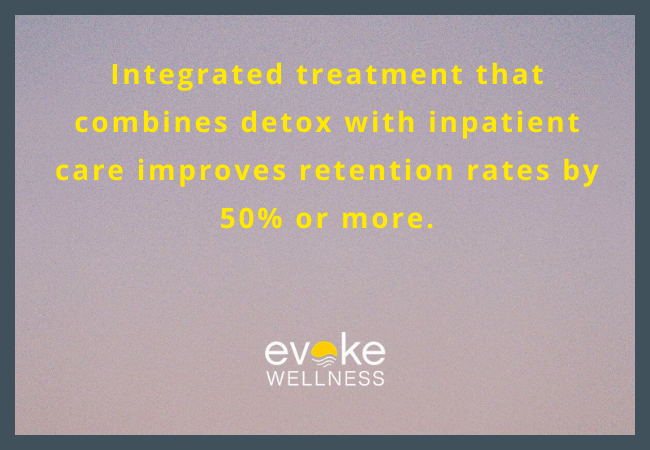Inpatient rehab is often the turning point for individuals struggling with addiction and co-occurring mental health disorders. One of the foundational pillars of a successful inpatient treatment experience is therapy. While detox may rid the body of harmful substances, therapy helps individuals unpack the underlying emotional, behavioral, and psychological triggers that contribute to substance use. This deeper level of work begins in inpatient rehab and lays the groundwork for long-term healing and sustainable recovery.
At Evoke Wellness, inpatient rehab is a structured, supportive environment designed to foster personal growth and transformation. Whether you’re new to treatment or transitioning from detox, understanding the role of therapy in inpatient rehab programs can help ease fears and prepare you for the journey ahead.
Why Therapy Is Essential in Inpatient Rehab
Substance use disorder (SUD) is more than a physical dependency—it’s a chronic, relapsing condition rooted in a complex interplay of behavioral, emotional, and environmental factors. Therapy plays a crucial role in helping individuals identify these factors and develop healthy coping strategies.
In an inpatient setting, therapy is integrated into every part of the client’s day. With 24/7 support and a distraction-free environment, clients can fully immerse themselves in the therapeutic process. The structured nature of inpatient care allows for daily therapy sessions, emotional breakthroughs, and the building of a strong foundation for recovery.
Objectives of Therapy in Inpatient Rehab:
-
Address the psychological roots of addiction
-
Develop tools to manage triggers and cravings
-
Rebuild self-esteem and a sense of self-worth
-
Establish healthy routines and life skills
-
Repair interpersonal relationships
-
Create a personalized aftercare plan
Types of Therapy in Inpatient Rehab
At Evoke Wellness, our therapy approach is evidence-based, trauma-informed, and deeply personalized. We understand that each individual comes with unique challenges, experiences, and goals. As such, we offer a diverse array of therapeutic modalities tailored to meet those needs.
1. Individual Therapy
One-on-one therapy with a licensed clinician allows for focused, confidential exploration of personal challenges. Clients often work through trauma, family dynamics, grief, depression, or anxiety that may be contributing to their addiction.
A common approach used in individual therapy is Cognitive Behavioral Therapy (CBT). This method helps clients identify and reframe negative thought patterns and behaviors, equipping them with tools to respond to life’s challenges in healthier ways. As part of our Cognitive-Behavioral Therapy Program in Ohio, CBT is a cornerstone of recovery work and is tailored to support dual diagnosis and relapse prevention.
2. Group Therapy
Group therapy provides a sense of belonging, validation, and perspective. Led by a therapist, these sessions allow clients to share experiences, practice social skills, and learn from one another. Common group topics include relapse prevention, trauma recovery, emotional regulation, and life skills training.
Participation in group therapy can also reduce feelings of isolation, a common issue in early recovery. It encourages empathy, active listening, and mutual support, all of which are critical for long-term success.
3. Family Therapy
Addiction affects not just the individual but the entire family system. Family therapy sessions aim to improve communication, resolve past conflicts, and educate loved ones about addiction and recovery. Healing fractured relationships can strengthen the client’s support network post-treatment.
At Evoke Wellness, family involvement is encouraged when appropriate. These sessions may be done in person or virtually, depending on availability and client preference.
4. Trauma-Informed Therapy
Many individuals with substance use disorders have experienced trauma. Ignoring this trauma can lead to relapse and stalled recovery. Trauma-informed care ensures that therapy is delivered with sensitivity, safety, and an understanding of how past experiences shape current behaviors.
Therapists at Evoke Wellness use modalities such as EMDR (Eye Movement Desensitization and Reprocessing), Somatic Therapy, and narrative approaches to help clients process trauma without retraumatization.
5. Dual Diagnosis Therapy
It’s not uncommon for clients to enter rehab with both a substance use disorder and a mental health condition like anxiety, depression, PTSD, or bipolar disorder. These co-occurring disorders require specialized care. Our Dual Diagnosis Treatment Program in Ohio integrates psychiatric services with addiction therapy to ensure both issues are addressed concurrently.
This comprehensive approach enhances outcomes by treating the whole person, not just the symptoms of addiction.
What a Typical Therapy Day Looks Like in Inpatient Rehab
While each day is thoughtfully structured to promote healing and accountability, every client has a tailored schedule based on their treatment plan. A typical day at Evoke Wellness may look something like this:
-
7:00 AM – Wake-Up and Morning Routine
Clients begin their day with personal hygiene, medication (if applicable), and breakfast. -
8:00 AM – Morning Meditation or Mindfulness Practice
Grounding activities help set a calm and intentional tone for the day. -
9:00 AM – Group Therapy Session
A therapist-led group that may focus on relapse prevention, coping skills, or emotional processing. -
11:00 AM – Individual Therapy Session
Time for deep one-on-one work tailored to your specific goals and concerns. -
12:00 PM – Lunch Break
-
1:00 PM – Educational Workshop or Psychoeducation
Sessions on the science of addiction, mental health awareness, or practical skills like budgeting and communication. -
2:30 PM – Recreational or Holistic Therapy
Activities may include yoga, art therapy, music therapy, or physical exercise. -
4:00 PM – Process Group or Peer Support Meeting
-
6:00 PM – Dinner and Personal Time
-
7:30 PM – 12-Step Meeting or Optional Evening Group
-
9:00 PM – Reflection, Journaling, and Bedtime Routine
This schedule provides structure and balance—allowing for introspection, emotional work, rest, and connection with others.
Benefits of Therapy in Inpatient Rehab
Therapy doesn’t just help you stay sober during rehab—it gives you tools for lifelong success. Below are some of the most profound benefits:
-
Improved emotional regulation – Learn to handle stress without resorting to substances
-
Stronger relationships – Rebuild trust and communicate more effectively
-
Increased self-awareness – Understand how your thoughts, beliefs, and past experiences influence your behavior
-
Better decision-making – Make choices aligned with your recovery goals
-
Confidence and resilience – Gain the strength to face challenges head-on
These skills are critical for transitioning from rehab to daily life and managing long-term recovery.
Why Choose Evoke Wellness for Inpatient Rehab?
At Evoke Wellness, we believe that inpatient rehab is not just a treatment phase—it’s a life-changing opportunity to rediscover who you are beyond addiction. From the moment you walk through our doors, our team is committed to helping you feel safe, supported, and empowered. Our approach to therapy is grounded in clinical excellence, evidence-based practices, and genuine compassion for every person we serve.
1. Evidence-Based Therapeutic Modalities
We utilize the most effective therapeutic approaches available today, including Cognitive-Behavioral Therapy (CBT), Dialectical Behavior Therapy (DBT), EMDR for trauma, family systems therapy, and motivational interviewing. Each therapy plan is carefully customized to match your diagnosis, personality, and goals—ensuring your care is always relevant and effective.
2. Dual Diagnosis Expertise
Addiction rarely exists in a vacuum. Many clients also struggle with depression, anxiety, PTSD, or bipolar disorder. Our dual diagnosis treatment program in Ohio ensures you receive integrated care for both addiction and mental health, which dramatically improves your long-term success in recovery.
3. Personalized Treatment Planning
No two people are the same, and neither are their treatment needs. At Evoke Wellness, every client receives a detailed treatment plan created in collaboration with our clinical team. This plan outlines your therapy schedule, clinical goals, medication needs, and holistic supports—offering a roadmap tailored just for you.
4. Supportive and Credentialed Staff
Our team includes board-certified addiction medicine physicians, licensed therapists, psychiatrists, case managers, and 24/7 nursing staff. Beyond credentials, our professionals are deeply compassionate, many of whom are in recovery themselves and understand your journey on a personal level.
5. Safe, Comfortable, and Peaceful Environment
Located in beautiful, private settings, our facilities are intentionally designed to promote calm, reflection, and focus. You’ll be surrounded by people who care, in a space that encourages healing—away from the distractions and pressures of everyday life.
Conclusion
Therapy in inpatient rehab is far more than just talk—it’s a transformative process that allows individuals to rebuild their lives from the ground up. By addressing the root causes of addiction, managing mental health, and developing resilience, therapy is the bridge between detox and long-term recovery.
At Evoke Wellness, we are honored to help you or your loved one take that first step. With our holistic and evidence-based approach, we provide every tool necessary to make recovery possible—and sustainable.
If you’re ready to begin healing through our addiction treatment programs in Ohio, or need support through our Intensive Inpatient Treatment Program in Hilliard, OH, we’re here for you. Contact our team confidentially at 866.430.9267 to get started today.
Frequently Asked Questions
What types of therapy are offered in inpatient rehab?
Inpatient rehab programs often include a variety of evidence-based therapies such as Cognitive-Behavioral Therapy (CBT), Dialectical Behavior Therapy (DBT), trauma-informed therapy, group therapy, and family therapy. At Evoke Wellness, we tailor each therapeutic plan to your individual needs.
How often will I attend therapy sessions in inpatient treatment?
Most individuals in inpatient rehab participate in therapy daily. This includes a combination of individual counseling, group sessions, and specialty therapy tracks depending on mental health needs and progress.
Is therapy mandatory in inpatient rehab?
Yes, therapy is a foundational element of inpatient rehab. Participation is essential to address the root causes of addiction, build healthy coping mechanisms, and develop a sustainable recovery plan.
Can therapy help with co-occurring mental health issues?
Absolutely. Many people in rehab also struggle with mental health conditions. Evoke Wellness offers a dual diagnosis treatment program in Ohio to treat addiction and mental health simultaneously, improving outcomes and reducing the risk of relapse.
What is the goal of therapy in inpatient rehab?
The primary goal is to help you understand the underlying factors driving your substance use, heal from trauma, manage mental health symptoms, and build the skills necessary for long-term recovery and wellness.
Will I continue therapy after inpatient rehab?
Yes, ongoing therapy is strongly encouraged as part of your aftercare plan. This may include outpatient counseling, support groups, or continued mental health services. Evoke Wellness helps set you up with aftercare options to ensure continuity of care.
Can family members be involved in therapy?
Yes. Family therapy is often a key part of healing during inpatient treatment. Engaging loved ones in the process can improve communication, rebuild trust, and create a supportive home environment after discharge.



